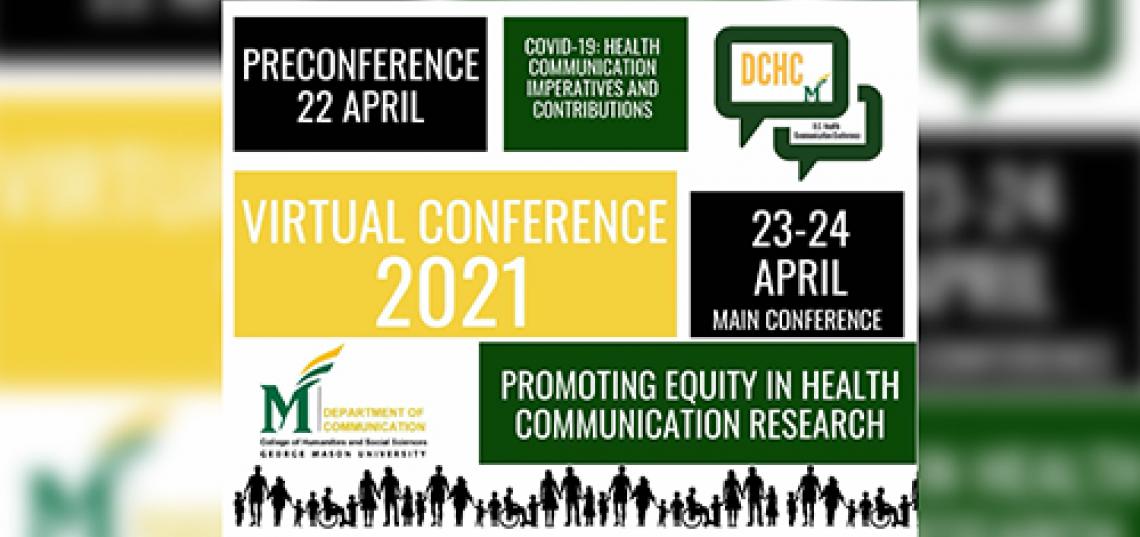
Seven scholars from SC&I, representing faculty members, alumni, and students will participate in the upcoming D.C. Health Communication Conference (DCHC) sponsored by George Mason University’s Communication Department and the Center for Health and Risk Communication.
DCHC 2021, celebrating its tenth anniversary this year, will begin with a preconference, “Health Communication Imperatives and Contributions,” which will be held virtually on April 22. The main conference will be held virtually April 23-24. The conference theme is “Promoting Equity in Health Communication Research.”
The keynote address for the main conference will be held on Friday, April 23 and will be presented by Dr. Mohan Dutta, Dean’s Chair Professor in the School of Communication, Journalism and Marketing and Director of the Center for Culture-Centered Approach to Research and Evaluation (CARE) at Massey University in New Zealand. The keynote title is “Addressing structural inequalities that shape outbreak inequality: Community sovereignty as radical democracy.”
The closing keynote address, held on Saturday, will be presented by the conference’s 2021 Atkin Translational Scholar Award winner, Kami Silk, Rosenberg Professor of Communication and the Chair of the Department of Communication at the University of Delaware.
Noting this is the first time in its history that the conference has been held virtually, the conference planners wrote on their website, “It would be easy to say, ‘two years ago when we last met, we could not have imagined we would be running DCHC 2021 as a virtual conference.’ And that is true. But it is also true that the pandemic was both foreseen and preventable. The COVID-19 pandemic illustrates the importance of communication to prevent and manage heath crises. And yet, here we are – our work cut out for us. Thursday’s pre-conference provides deep discussion about the current and potential contributions of health communication scholarship to understanding and overcoming the pandemic.
“DCHC 2021 will be an exciting three days as participants come together virtually across the globe to discuss research, theory, and practice in health communication. We hope you’ll reconnect with old friends and make new ones, enjoy intellectually stimulating presentations and discussions, generate new ideas for research and collaborations, and have an overall outstanding conference experience.”
SC&I Participants:
Faculty members:
Kathryn Greene, Professor of Communication
Maria K. Venetis, Ph.D. ’10, Associate Professor of Communication
Part-Time Faculty members:
Ralph Gigliotti, Ph.D., ‘17
Christine Goldthwaite, MA ’10, Ph.D. ‘18
Doctoral Students:
Masters Students:
Angela Senger-Mersich (Master of Communication and Media)
See below for complete information about when SC&I participants are scheduled, and paper/poster titles:
Day 1: Friday, April 23
1:15 – 2:45 Concurrent panels 4-6
Panel 6: Entertainment Education, Young People, & Health Interventions
“Exploring Adolescent Vaping: The Influences of Parental Monitoring and Parental Media Monitoring.”
HyeJeong Choi, Missouri; Michelle Miller-Day, REAL Prevention; Michael L. Hecht, REAL Prevention; Shannon D. Glenn, Penn State University; Rachel E. Lyons, Rutgers University; Kathryn Greene, Rutgers University.
Poster Session Three – Posters 65 – 97
4:30 – 5:00 p.m.
Poster Number 74:
“Gynecologic Cancer Treatment Appointments: Healthcare Providers’ Assessments of the Role of Support Persons.”
Angela Senger-Mersich, Rutgers School of Communication and Information; Kathryn Greene, Rutgers School of Communication and Information; Maria K. Venetis, Rutgers School of Communication and Information; Danielle Catona, George Mason University; Alexandre Buckley de Meritens, Rutgers Cancer Institute of New Jersey; Katie Devine, Rutgers Cancer Institute of New Jersey.
Day 2: Saturday, April 24
9:45 – 11:15 Concurrent panels 10-12
Panel 10: Health Disparities and Minority Communities
“Leading Interdisciplinary and Translational Collaborations for Addressing Health Disparities.”
Christine Goldthwaite, Rutgers Center for Organizational Leadership; Sara Spear, Rutgers Center for Organizational Leadership; Ralph Gigliotti, Rutgers Center for Organizational Leadership.
Panel 11: Issues in Provider-Patient Communication in Varied Medical Contexts
“’If I need your help, I'll include you in the conversation’: Aligning and Diverging Perceptions in Triadic Cancer Communication.”
Lauren Lee, Rutgers University; Kathryn Greene, Rutgers School of Communication and Information; Maria K. Venetis, Rutgers School of Communication and Information; Allyson C. Bonetempo, Rutgers School of Communication and Information; Danielle Catona, George Mason University; Alexandre Buckley de Meritens, Rutgers Cancer Institute of New Jersey, Katie A. Devine, Rutgers Cancer Institute of New Jersey.
Funding for DCHC and its partner conference, KCHC, is made possible in part by a grant (R13CA168316) from the National Cancer Institute and the Office of Behavioral and Social Sciences Research.
Image credit: DCHC Conference website
